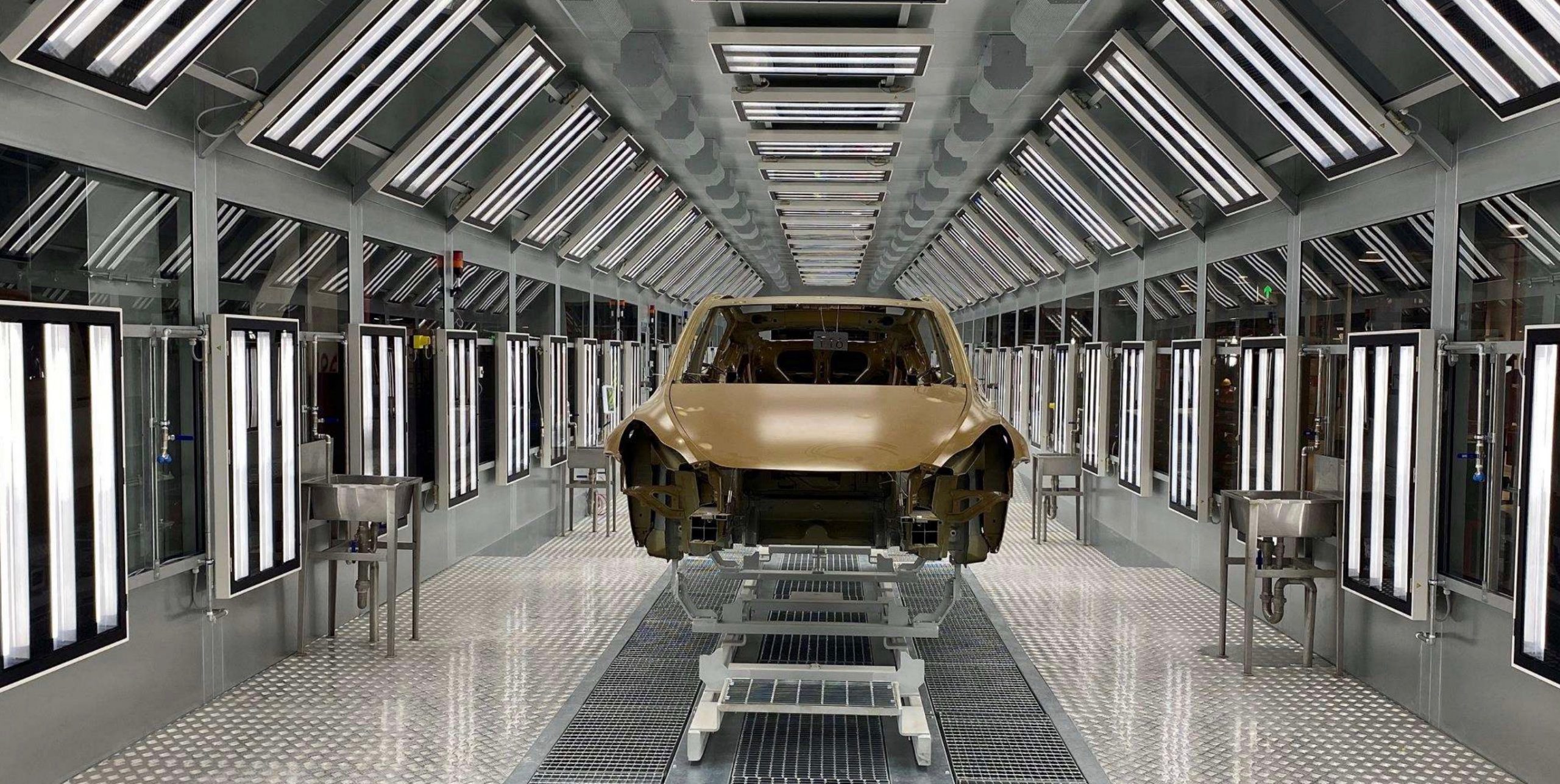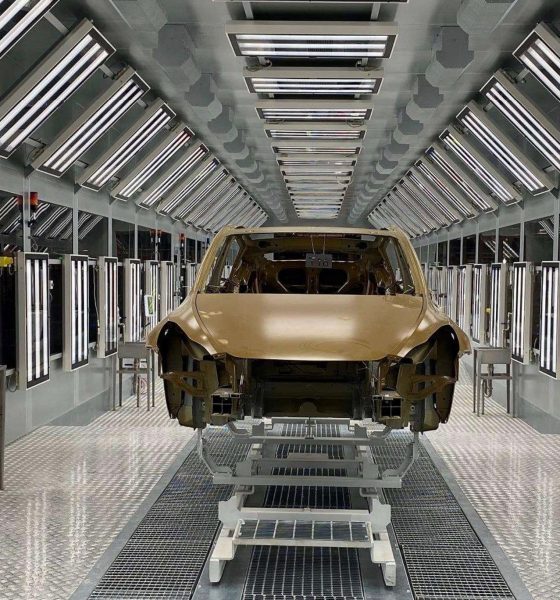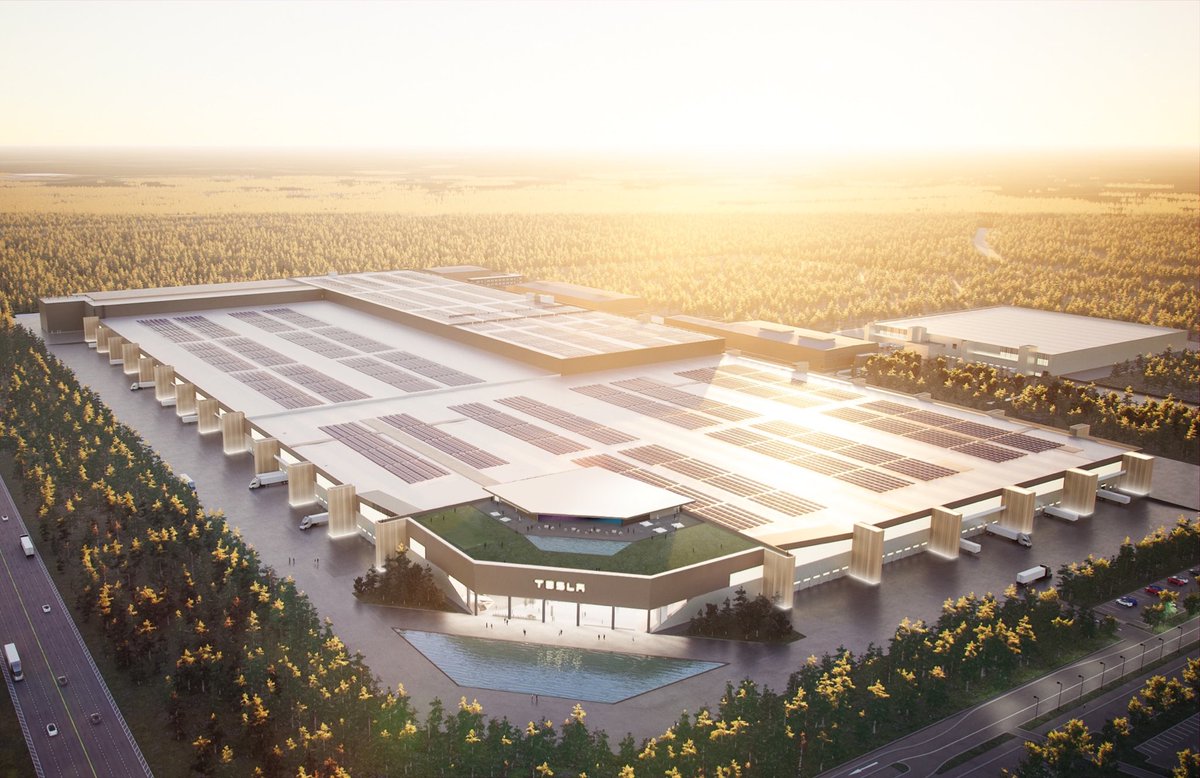

News
Tesla’s next-gen Model Y from Giga Berlin aims to redefine ‘German engineering’
Tesla’s next-generation Model Y from Giga Berlin in Germany may redefine “German engineering.” A Tweet from CEO Elon Musk shows the company aims to improve build quality down to the micron, a unit of measurement that is equivalent to one-thousandth of a millimeter.
“German engineering” is a phrase that has been around for decades and commonly refers to the precision and accuracy that German products are known for. In the automotive industry’s history, German vehicles have highly been regarded as the most luxurious, highest quality cars that money can buy. In the early years of industry and engineering, Germany had the best machines and the most advanced processes for building basically anything, but cars were the specialty. Strict standards and an attitude that aimed toward perfection made German vehicles the cream of the crop in the automotive industry.
Tesla Gigafactory Berlin render (Credit: Tesla)
This theory still holds true in today’s industry in many ways. While other companies and other regions have highly effective processes for vehicle manufacturing, Germany still has a certain mystique about it. With brands like Mercedes-Benz, Audi, and BMW, three of the most luxurious brands in the automotive market today, German engineering still holds a high standard.
However, Tesla has plans to reinvent the wheel when speaking about the term “German engineering.” In the last 18-or-so months since Elon Musk announced that Tesla’s first European Gigafactory would be in Germany, many developments have hinted toward Giga Berlin being the most advanced and most sophisticated factory that Tesla has in its arsenal. From a new, world-class paint facility to some of the most accurate automated machinery on the planet, Tesla is pulling out all the stops to keep up with Germany’s best brands.
In a Tweet earlier today, Musk said that Tesla is aiming for “extreme precision” with the next-gen Model Y. The company will aim for microns of accuracy, not millimeters, as Tesla aims to continue refining its manufacturing processes to make some of the highest-quality vehicles on Earth.
Aiming for extreme precision with next gen Model Y – microns, not millimeters
— Elon Musk (@elonmusk) May 18, 2021
In the past, Tesla has been criticized for poor build quality with some of its vehicles. Some owners have highlighted panel gaps or paint quality issues with their vehicles, which has led to an overwhelming misconception that Tesla produces lackluster vehicles. The truth is that all vehicle manufacturers have issues with build quality from time to time. Things as simple as an increased production rate can affect the quality of a vehicle. Some, however, like automotive veteran Sandy Munro, have stated that Tesla’s build quality has improved significantly over the years. Munro went from highly critical of the Model 3 during a teardown several years ago to overwhelmingly impressed with the new builds of the car.
“This car has improved significantly,” Munro said. “The paint is great; it’s very impressive.”
The accuracy that Tesla is aiming for with the next-gen all-electric Model Y crossover is extremely precise. A micron is one-thousandth of a millimeter, so it’s a unit that is not necessarily visible to the human eye. If Tesla can refine its manufacturing lines in Berlin to reach this level, the definition of German engineering may once again be reconfigured to include Tesla’s near-perfect build quality.
What do you think? Let us know in the comments below, or feel free to reach out to me directly at @KlenderJoey on Twitter or through email at joey@teslarati.com.

Elon Musk
Elon Musk hints Tesla investors will be rewarded heavily
“Hold onto your Tesla stock. It’s going to be worth a lot, I think. That’s my bet,” Musk said.

Elon Musk recently hinted that he believes Tesla investors will be rewarded heavily if they continue to hold onto their shares, and he reiterated that in a new interview that the company released on its social accounts this week.
Musk is one of the most successful CEOs in the modern era and has mammothed competitors on the Forbes Net Worth List over the past year as his holdings in his various companies have continued to swell.
Tesla investors, especially those who have been holding shares for several years, have also felt substantial gains in their portfolios. Over the past five years, the stock is up over 78 percent. Since February 2019, nearly seven years ago to the day, the stock is up over 1,800 percent.
Musk said in the interview:
“Hold onto your Tesla stock. It’s going to be worth a lot, I think. That’s my bet.”
Elon Musk in new interview: “Hold on to your $TSLA stock. It’s going to be worth a lot, I think. That’s my bet.” pic.twitter.com/cucirBuhq0
— Sawyer Merritt (@SawyerMerritt) February 26, 2026
It’s no secret Musk has been extremely bullish on his own companies, but Tesla in particular, because it is publicly traded.
However, the company has so many amazing projects that have an opportunity to revolutionize their respective industries. There is certainly a path to major growth on Wall Street for Tesla through its various future projects, including Optimus, Cybercab, Semi, and Unsupervised FSD.
- Optimus (Tesla’s humanoid robot): Musk has discussed its potential for tasks like childcare, walking dogs, or assisting elderly parents, positioning it as a massive long-term driver of company value.
- Cybercab (Tesla’s robotaxi/autonomous ride-hailing vehicle): a fully autonomous vehicle geared specifically for Tesla’s ride-sharing ambitions.
- Semi (Tesla’s electric truck, with mentions of expansion, like in Europe): brings Tesla into the commercial logistics sector.
- Unsupervised FSD (Full Self-Driving software achieving full autonomy without human supervision): turns every Tesla owner’s vehicle into a fully-autonomous vehicle upon release
These projects specifically are some of the highest-growth pillars Tesla has ever attempted to develop, especially in Musk’s eyes, as he has said Optimus will be the best-selling product of all-time.
Many analysts agree, but the bullish ones, like Cathie Wood of ARK Invest, are perhaps the one who believes Tesla has incredible potential on Wall Street, predicting a $2,600 price target for 2030, but this is not even including Optimus.
She told Bloomberg last March that she believes that the project will present a potential additive if Tesla can scale faster than anticipated.
Cybertruck
Tesla drops latest hint that new Cybertruck trim is selling like hotcakes
According to Tesla’s Online Design Studio, the new All-Wheel-Drive Cybertruck will now be delivered in April 2027. Earlier orders are still slated for early this Summer, but orders from here on forward are now officially pushed into next year:

Tesla’s new Cybertruck offering has had its delivery date pushed back once again. This is now the second time, and deliveries for the newest orders are now pushed well into 2027.
According to Tesla’s Online Design Studio, the new All-Wheel-Drive Cybertruck will now be delivered in April 2027. Earlier orders are still slated for early this Summer, but orders from here on forward are now officially pushed into next year:
🚨 Tesla has updated the $59,990 Cybertruck Dual Motor AWD’s estimated delivery date to April 2027.
First deliveries are still slated for June, but if you order it now, you’ll be waiting over a year.
Demand appears to be off the charts for the new Cybertruck and consumers are… pic.twitter.com/raDCCeC0zP
— TESLARATI (@Teslarati) February 26, 2026
Just three days ago, the initial delivery date of June 2026 was pushed back to early Fall, and now, that date has officially moved to April 2027.
The fact that Tesla has had to push back deliveries once again proves one of two things: either Tesla has slow production plans for the new Cybertruck trim, or demand is off the charts.
Judging by how Tesla is already planning to raise the price based on demand in just a few days, it seems like the company knows it is giving a tremendous deal on this spec of Cybertruck, and units are moving quickly.
That points more toward demand and not necessarily to slower production plans, but it is not confirmed.
Tesla Cybertruck’s newest trim will undergo massive change in ten days, Musk says
Tesla is set to hike the price on March 1, so tomorrow will be the final day to grab the new Cybertruck trim for just $59,990.
It features:
- Dual Motor AWD w/ est. 325 mi of range
- Powered tonneau cover
- Bed outlets (2x 120V + 1x 240V) & Powershare capability
- Coil springs w/ adaptive damping
- Heated first-row seats w/ textile material that is easy to clean
- Steer-by-wire & Four Wheel Steering
- 6’ x 4’ composite bed
- Towing capacity of up to 7,500 lbs
- Powered frunk
Interestingly, the price offering is fairly close to what Tesla unveiled back in late 2019.
Elon Musk
Elon Musk outlines plan for first Starship tower catch attempt
Musk confirmed that Starship V3 Ship 1 (SN1) is headed for ground tests and expressed strong confidence in the updated vehicle design.

Elon Musk has clarified when SpaceX will first attempt to catch Starship’s upper stage with its launch tower. The CEO’s update provides the clearest teaser yet for the spacecraft’s recovery roadmap.
Musk shared the details in recent posts on X. In his initial post, Musk confirmed that Starship V3 Ship 1 (SN1) is headed for ground tests and expressed strong confidence in the updated vehicle design.
“Starship V3 SN1 headed for ground tests. I am highly confident that the V3 design will achieve full reusability,” Musk wrote.
In a follow-up post, Musk addressed when SpaceX would attempt to catch the upper stage using the launch tower’s robotic arms.
“Should note that SpaceX will only try to catch the ship with the tower after two perfect soft landings in the ocean. The risk of the ship breaking up over land needs to be very low,” Musk clarified.
His remarks suggest that SpaceX is deliberately reducing risk before attempting a tower catch of Starship’s upper stage. Such a milestone would mark a major step towards the full reuse of the Starship system.
SpaceX is currently targeting the first Starship V3 flight of 2026 this coming March. The spacecraft’s V3 iteration is widely viewed as a key milestone in SpaceX’s long-term strategy to make Starship fully reusable.
Starship V3 features a number of key upgrades over its previous iterations. The vehicle is equipped with SpaceX’s Raptor V3 engines, which are designed to deliver significantly higher thrust than earlier versions while reducing cost and weight.
The V3 design is also expected to be optimized for manufacturability, a critical step if SpaceX intends to scale the spacecraft’s production toward frequent launches for Starlink, lunar missions, and eventually Mars.








